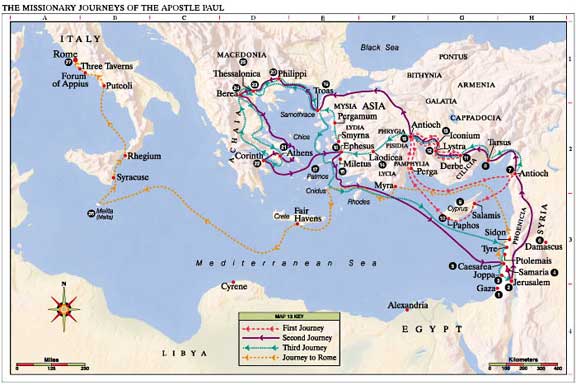|
CHRISTIAN APOSTLE PAUL
Love bears all things,
believes all things, hopes all things, endures all things
St. Paul’s significance in the history of Christianity
can hardly be underestimated: an indefatigable missionary,
the first interpreter of Jesus Christ to the Gentile world,
he is also the author of more New Testament books
than any other writer.Paul is considered The second "odd"
apostle (besides Matthias) because of his position as the
fourteenth apostle. By examining Jesus' statement in
Matthew, "upon twelve thrones, judging the twelve tribes of
Israel". A light survey of the the Old Testament will reveal
that there was indeed thirteen tribes of Israel. Each of the
tribes of Israel were called by son of Israel who fathered
the respective tribe. However, the tribe belonging to
Israel's son, Joseph, was split into two more tribes, named
after Joseph's sons, Ephraim and Mansseh
(Genesis 48:1-6). In spite of their being thirteen tribes,
the tribes of Israel continued to be called the "twelve"
after the twelve original sons of Israel. Likewise, the
office left vacant by Judas was split into two offices,
which were filled by Matthias and Paul. This similarity is
enforced by Jesus who linked their reign upon twelve thrones
to the twelve tribes of Israel. Therefore, there were and
are twelve apostles: eleven original, and the twelfth office
being split into two - just as the twelve tribes of Israel.
Controversy has always swirled
around Paul. In fact, it began during his lifetime.
|
|
As a Pharisaic persecutor of Christianity who became one of
its most vocal and active exponents, as a Jew who preached
to Gentiles, and as a missionary and pastor who had to deal
with a wide range of demanding situations across several
decades and many miles, it is hardly surprising that Paul
should attract a body of critics and defenders who are as
numerous and intense as his stature is titanic.
The 13 letters associated with Paul, together with the large
sections of the Acts of the Apostles that recount his
missionary journeys, form the bulk of the New Testament. His
writings—nearly all of which were set down and circulated
before the Gospels were written—have been endlessly scoured
as sources for Christian doctrine and morals.
Paul is an eloquent and passionate poet of the divine. His works are
full of unforgettable passages, and his words have exercised an
important influence on countless "ordinary" believers as well as
theological giants such as Augustine and Luther.
Paul's personality has been endlessly analyzed. He is one of the
great converters (or turncoats, depending on one's perspective) in
history. Modern thinkers inclined to fault Christianity—Nietzsche,
Freud, and George Bernard Shaw, to name three of the more
famous—often save their most intense scrutiny for Paul, whose views
on issues of morality, sex, and authority continue to be
contentious.
Of all the apostles, Paul stands out as the one who was the traveler
par excellence. His journeys through the length and breadth of the
ancient world are nothing short of remarkable and given the
difficulties of traveling in these times, let alone the animosity
and danger he faced trying to convert populations to the new faith,
it is a credit to the endurance and tenacity of the man that he
accomplished as much as he did.
He is traditionally represented as a stocky little man, with a bald
head and a bushy beard. He studied Jewish law in Jerusalem under the
famous rabbi Gamaliel. He and his parents were Roman
citizens, having special rights and privileges. Roman citizens could
not be imprisoned without a trial nor could they be scourged or
crucified. His Roman citizenship saved Paul many times during his
ministry. He made three great missionary journeys before being
arrested in Jerusalem and taken to Rome where he was beheaded in AD
62.
Paul's journeys and imprisonments:
| Paul at
Damascus |
37-40 AD
|
| First Journey
|
45-47 AD
|
| Second Journey
|
51-53 AD
|
| Third Journey
|
54-58 AD
|
| Imprisonment in
Judea |
58-60 AD
|
| Voyage to Rome
|
60-61 AD
|
| Imprisonment in
Rome |
61-63 AD
|
| Post-Imprisonment Journeys |
63-67 AD
|
Paul's Epistles:
| First
Thessalonians |
52 AD
|
| Second
Thessalonians |
52 AD
|
| First
Corinthians |
57 AD
|
| Second
Corinthians |
57 AD
|
| Galatians
|
55-57 AD
|
| Romans
|
57-58 AD
|
| Ephesians
|
62 AD
|
| Philippians
|
62 AD
|
| Colossians
|
62 AD
|
| Philemon
|
63 AD
|
| Hebrews
|
64-65 AD
|
| Titus
|
64-65 AD
|
| First
Timothy |
64-65 AD
|
| Second
Timothy |
66-67
|
On all of his journeys he traveled along the coast of Asia Minor and
there are many places along the coast where he stopped and taught,
or changed boats, or sheltered from the weather. The book of Acts
covers most of his exploits and journeys as well as his last voyage
as a prisoner to Rome.
At the instruction of the Holy Ghost, the leaders of the church in
Antioch sent out Barnabas and Paul as missionaries (Acts 13:1-3).
Paul's missionary trips are described in the Book of Acts and are
divided into three separate journeys plus a last journey to Rome.


Symbol - Sword of the Spirit
Paul was martyred in Rome, probably by beheading in 68 AD. Because
he spoke of the Word of God as the "Sword of the Spirit" that is his
symbol. St. Paul's Day is January 25.
Preserve me, O God, for I take refuge
in thee.
Paul, Psalm 16:1

|